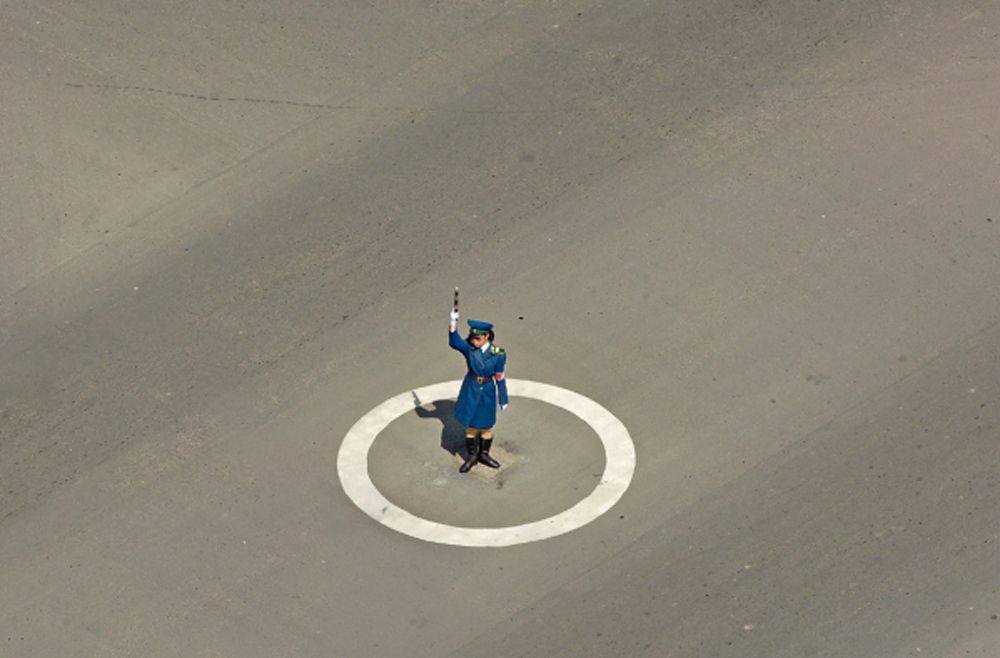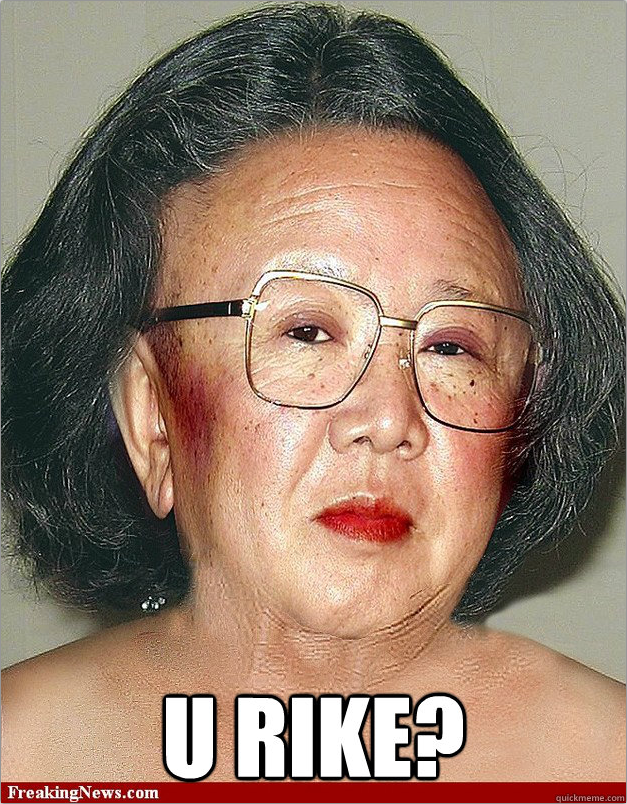-
IP addresses are NOT logged in this forum so there's no point asking. Please note that this forum is full of homophobes, racists, lunatics, schizophrenics & absolute nut jobs with a smattering of geniuses, Chinese chauvinists, Moderate Muslims and last but not least a couple of "know-it-alls" constantly sprouting their dubious wisdom. If you believe that content generated by unsavory characters might cause you offense PLEASE LEAVE NOW! Sammyboy Admin and Staff are not responsible for your hurt feelings should you choose to read any of the content here. The OTHER forum is HERE so please stop asking.
You are using an out of date browser. It may not display this or other websites correctly.
You should upgrade or use an alternative browser.
You should upgrade or use an alternative browser.

Learning Center
Portraits of Kim Il Sung and Kim Jong Il overlook a classroom at a model secondary school, where students busy themselves with physics experiments.
looks like Singapore

Learning Center
Portraits of Kim Il Sung and Kim Jong Il overlook a classroom at a model secondary school, where students busy themselves with physics experiments.
nice crt monitor
Beijing protests after N.K. army deserter kills 4
Published: 2015-01-05 21:11
Updated: 2015-01-05 21:11
SHENYANG, China/BEIJING (Yonhap) ― China said Monday it had lodged a protest with North Korea after a North Korean army deserter killed four Chinese citizens in an apparent robbery in the Chinese border city of Helong late last month.
The incident took place on Dec. 28 last year in the border town of Nanping in Helong, just north of the Tumen River overlooking North Korea’s North Hamkyong Province, a source with knowledge of the incident told Yonhap on condition of anonymity.
Asked about the incident, China’s foreign ministry spokeswoman Hua Chunying told reporters, “We have lodged a representation with the North Korean side and China’s public security authorities are dealing with the issue.” Hua declined to elaborate further.
The gun-wielding North Korean man killed the four Chinese citizens and injured another Chinese person at their homes during an apparent robbery, according to the source.
Chinese police and military authorities caught the suspect after a manhunt. The suspect has since been under investigation, according to the source.
Chinese authorities have not announced the incident and the country’s state-run media organizations also have remained silent.
“The Chinese authorities have ended a consultation with the North Korean side in dealing with the case and decided not to make the case public,” the source said.
It is not uncommon for North Korean soldiers or citizens to cross the border into Chinese towns and attempt robberies.
In December 2013, a North Korean defector in his 20s killed an elderly Chinese couple in the Chinese border city of Yanji and stole 20,000 yuan ($3,210). The North Korean defector was caught by Chinese authorities after fleeing to Beijing.
News delay over killings of Chinese residents by North Korean suspect 'hurt government's credibility'
PUBLISHED : Tuesday, 06 January, 2015, 3:10pm
UPDATED : Tuesday, 06 January, 2015, 3:13pm
Laura Zhou [email protected]
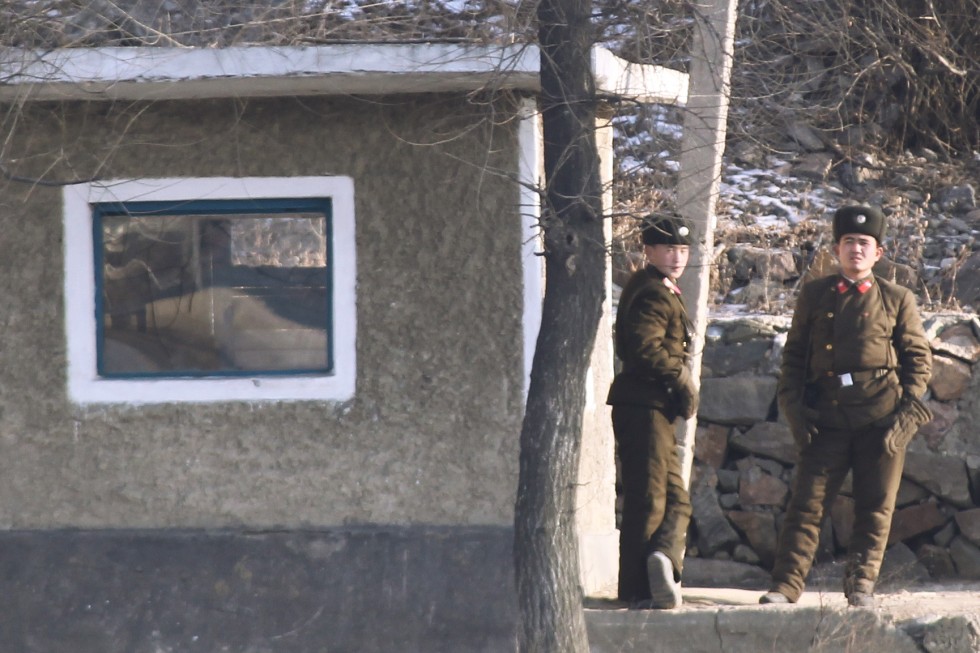
Two North Korean soldiers stand guard on the border with China. Photo: Simon Song
The delay in releasing news about last month’s killing of four Chinese residents in a border town by a suspected North Korean army deserter had damaged the credibility of China’s government and media, a state-own newspaper claims.
South Korea’s Yonhap News Agency reported yesterday the suspect, who reportedly crossed the border in search of food, was in custody after being shot and wounded by Chinese police after shooting to death the residents in a robbery in Helong late last month.
“It obviously should not be the case that four Chinese citizens were killed more than one week ago, yet this was revealed by irrelevant South Korean media, while Chinese authorities have no information at all,” an editorial in the Chinese newspaper Global Times, owned by the Communist Party’s mouthpiece, People’s Daily, said.
Yonhap quoted an unnamed South Korean official saying that Chinese authorities had reached agreement with North Korea not to report news of the killings.
The Global Times editorial said that sensitivity over bilateral relations between China and North Korea could be the reason why Chinese authorities had remained silent about the case.
“However, the North Korean soldier represented neither the North Korean government, nor the North Korean people,” the editorial added.
“What does it have to do with the relations between China and North Korea?
“He must be convicted if he has committed robbery and murder.”
Yesterday, China – in its first public comment about the case – said it was lodging a formal complaint with Pyongyang.
Hua Chunying, the Foreign Ministry spokeswoman, said: “We’ve lodged a protest with North Korea and Chinese authorities are dealing with the issue according to the law.”
Bilateral relations between the two Communist neighbours, who share a border stretching more than 1,400km, are believed to have become strained since North Korea’s carried out nuclear tests early last year.
However, China still is still North Korea’s most important ally – as well as the main food supplier and trade partner to the world’s most closed-off nation.
“Ties between China and North Korea should adopt to convention,” the editorial said. “But if the North Koreans fails to adopt it, we should help to guide it, rather than excessively acquiescing to them.
“If we fail to insist on common sense, China will have to pay for doubts and disputes that arise in our own society.”
Meanwhile, further details about the killings were revealed by mainland media today, with The Beijing News quoting local officials as saying that the four people who died in Nanping were two elderly couples, whose children were working in South Korea.
A village official told the newspaper that the suspect, who had carried a knife and a handgun, broke into the home of a villager, with the surname of Che, and ate food and stole 100 yuan (about HK$125).
The suspect had also taken away pork from another villager’s refrigerator, the newspaper reported.
nice crt monitor
I think so too.
nice crt monitor
Classic.......
this pic is iconic.
North Korea expanding nuclear threat and has built 6,000-strong cyber-army, claims South Korea
Missiles could potentially reach the US mainland, South Korea says
Emma Finamore
Tuesday 06 January 2015

South Korea’s defence ministry say that the North has evolved its nuclear and missiles threats, and built a 6,000-strong cyber-army.
According to a white paper released by the ministry and assessed by Yonhap news agency, North Korea appears to have achieved "a significant level" of technology, miniaturising nuclear warheads to fit on ballistic missiles.
These missiles could potentially reach the US mainland, South Korea's defense ministry claimed.
The report also said that North Korea has a 6,000-strong "cyber-army", dedicated to disrupting the South's military and government.
This figure is a doubling of its earlier estimate that the North had a cyberwarfare staff of 3,000.
The paper carried a technological analysis of the North's nuclear program, the first analysis of its kind.
The paper said: "North Korea's capabilities of miniaturizing nuclear weapons appear to have reached a significant level.
"North Korea is presumed to have secured some 40 kilograms of weapons-grade plutonium by reprocessing spent nuclear fuel roads multiple times, and it is evaluated to have been working on the highly enriched uranium program."
The ministry highlights North Korea's evolving nuclear and missiles threats, after Pyongyang’s third nuclear test in February 2013, even though the North is yet to demonstrate its new capabilities.
An unnamed ministry official told Yonhap: "We don't have any intelligence that North Korea completed the miniaturisation.
“In consideration of the fact that acquiring such technology takes around two to seven years in general and eight years have passed since the North conducted its first nuclear test, however, its capability for small nuclear warheads would have reached a significant level."
The paper follows previous reports from South Korea’s defence ministry which outlined the North's two underground detonation tests.
'Enjoying football is taboo' - North Korea
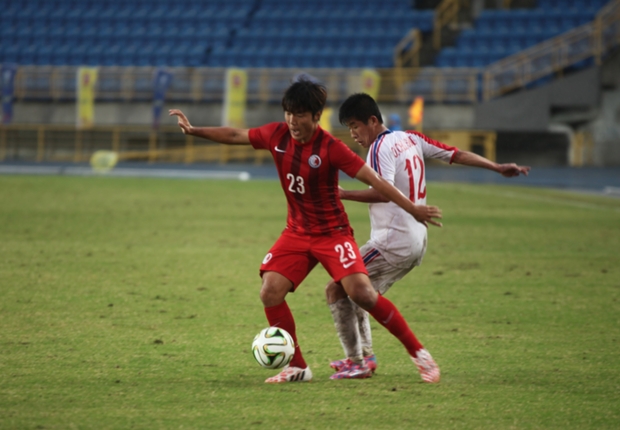
Jan 6, 2015 20:00:00
EXCLUSIVE: The country's public relations officer has revealed the squad's overpowering sense of duty to their people is greater than any pleasure derived from playing the game
By Takashi Sugiyama
A representative of North Korea has explained how enjoying football is considered taboo amongst their playing squad and secondary to the responsibility of representing the nation ahead of the Asian Cup.
The country kick off their Group B campaign on January 10 and must overcome Uzbekistan, China and Saudi Arabia to reach the knockout stages of the competition.
But while the colourful celebrations of several other Asian nations have lit up numerous international competitions, the North Korean mindset is somewhat different according to their public relations officer Lee Kang-Hong.
He told Goal: "To enjoy is taboo for us. I heard Japanese players told 'we want to enjoy football' but I can't understand it. I think football lovers can enjoy it but the players, as representatives of the
country, have to think about their primary standpoint."
The east Asian nation aren't among the favourites to advance to the knock-out stages of the competition but remain confident of reaching the semi-finals.
Kang-Hong continued: "We aim to be in the last four (at this tournament). We are drawn in a difficult group but if we aim to participate in Olympic Games or World Cup, it is inevitable we will play such strong teams.
"China have tall players and they are a bit rough but we can cope with it. But I think our team play cleanly and we will stay true to our values."
The use of the internet is heavily restricted in North Korea but typical rules have been relaxed so that rival nations can be watched prior to the tournament by the country's coaching staff.
"We watch our opponents' games via the internet. In our country we can't access the internet on a regular basis and we must apply or register to use the internet so our FA can see the foreign info. Also ambassadors abroad have sent us relevant videos."
A Project To Build A Satirical Kim Jong Un Video Game Has Raised $17,000

Screenshot of "Glorious Leader!"
A plan to build a satirical video game that glorifies North Korean leader Kim Jong Un as a WMD-wielding hero has attracted over $17,000 on Kickstarter.
The game, satirically titled “Glorious Leader!” will let the user play as Kim himself, fighting against US troops and his ultimate foe, President Barack Obama.
The developers have planned multiple stages and missions as well as special features like power-ups and unique weapons. At one point, you'll get to take down Sony, too. It will also let a second player join the game as Dennis Rodman, Kim’s childhood hero.
The game will be developed with 2D, 16-bit graphics, conjuring up memories of popular 90s games like Contra or Metal Slug. Despite its simple graphics, the game’s developer Moneyhorse told AP that Sony was “responsive” to the idea of turning it into a PlayStation game.
The game is planned for release on PC and mobile first. It has raised a little over $17,000, way short of its pledged goal of $55,000. But it still has 12 days to go, so if you’re one of those old-school gamers, you can head over to its Kickstarter page and make a donation.
Here’s the video of the project:
<iframe width="560" height="315" src="//www.youtube.com/embed/j8_X-9AIG-c?rel=0&showinfo=0" frameborder="0" allowfullscreen></iframe>
North Korea could likley build a mini nuclear device, South Korea's defence ministry believes
PUBLISHED : Wednesday, 07 January, 2015, 5:35am
UPDATED : Wednesday, 07 January, 2015, 5:35am
Agence France-Presse in Seoul
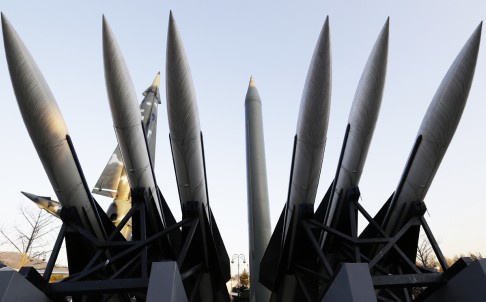
A North Korea's mock Scud-B missile (center) stands among South Korean missiles displayed at Korea War Memorial Museum in Seoul, South Korea. Photo: AP
South Korea's defence ministry said that North Korea appeared to have achieved a "significant" level of technology to miniaturise a nuclear device to be fitted on the tip of a missile.
The ministry made the warning in a white paper that was due to be released late yesterday, although defence officials said the nuclear-armed North has yet to demonstrate its miniaturisation capacity.
"North Korea's capabilities of miniaturising nuclear weapons appear to have reached a significant level," the ministry said.
Pyongyang has conducted three nuclear tests, most recently in February 2013.
The defence ministry said the North had probably secured some 40 kg of weapons-grade plutonium by reprocessing spent nuclear fuel rods, and that it is working on a highly enriched uranium programme.
Pyongyang mothballed the five-megawatt reactor at its main Yongbyon nuclear complex in 2007 under an aid-for-disarmament accord, but began renovating it in mid-2013. The facility is the country's main source of weapons-grade plutonium.
The North is presumed to have the capacity to developing missiles that could threaten the US mainland, through a series of long-range missile tests, the defence ministry said.
In 2012, Pyongyang demonstrated its rocket capabilities by sending a satellite into orbit, but it has yet to conduct a test that would show it had mastered the re-entry technology required for an inter-continental ballistic missile (ICBM).
South Korea's Yonhap news agency quoted an unnamed defence ministry official as saying the North's Taepodong-2 long-range missile is believed to have increased its range to 10,000 km from the previous estimate of up to 7,000 km.
But no signs have been detected that Pyongyang has put long-range missiles into service, it said.
______________________________________________
South Korean activists launch anti-North leaflets in balloons
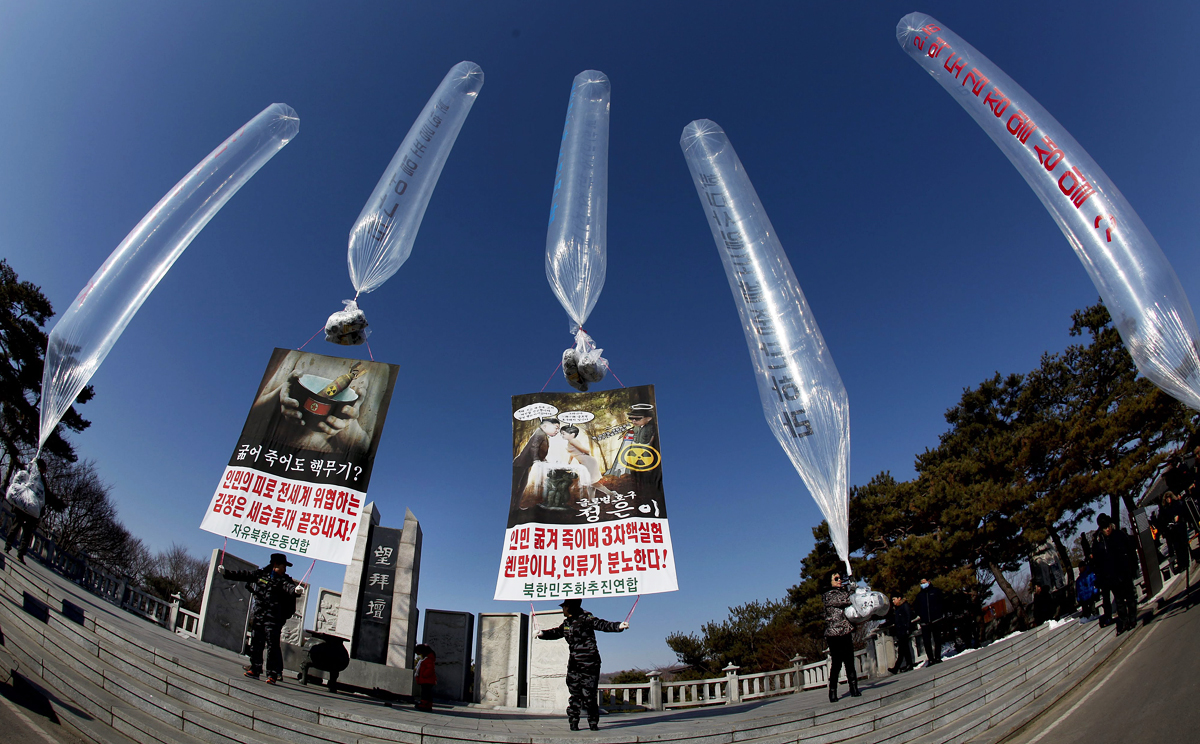
Similar balloons release sparked a brief exchange of gun fire between the two countries last year. Photo: EPA
South Korean activists have launched balloons carrying leaflets condemning Pyongyang across the border, an act that could derail fresh attempts to resume long-stalled dialogue between the two rivals.
Monday's launch - the first this year - came just days after the North's leader Kim Jong-un said that he was open to the "highest-level" talks with Seoul.
"We launched some 300,000 leaflets last night," Lee Min-bok, a North Korean defector who now heads the Campaign for Helping North Koreans, said. In October last year, Lee's balloons sparked a brief exchange of heavy machine gun fire across the border when the North attempted to shoot them down.
The incident scuppered a planned resumption of high-level talks between the two Koreas. Pyongyang - which refers to the activists as "human scum" - has long condemned the leaflet launches, asking that they be banned.
In his New Year's message, Kim also made it clear the South must stop criticising his regime.
Agence France-Presse
US Official Names The North Korean General Who May Have Ordered The Sony Hack
James Cook
Jan. 7, 2015, 4:35 PM

Director of National Intelligence James Clapper
US Director of National Intelligence James Clapper has said at a cybersecurity conference that he suspects his North Korean counterpart to be behind the hack of Sony Pictures.
The Daily Beast reports that Clapper said during his talk at the International Conference on Cybersecurity that General Kim Youn Chol may have been behind the hack.
Clapper explained that if North Korea was behind the hack, then General Kim would have had to authorise the action.
General Kim is a four-star general in charge of North Korea's Reconnaissance General Bureau, the organisation that Clapper claims is responsible for the Sony hack.
The speech also detailed Clapper's 2014 trip to North Korea, where he arranged the release of two prisoners. He claimed that during his dinner with General Kim, things got so heated that the two men were jabbing their fingers into each other's chests.
FBI Director: This Is How We Know North Korea Hacked Sony
James Cook
Jan. 7, 2015, 5:45 PM

FBI Director James Comey
The Director of the FBI, James Comey, revealed in a speech today how the US government managed to tie the hack of Sony Pictures to North Korea.
Speaking at the International Conference on Security, Comey explained how investigators at the FBI uncovered who was behind the cyberattack.
Comey told the conference that the hackers "got sloppy," accidentally revealing their real IP addresses in the emails they sent to Sony Pictures executives. He explained that the IP addresses are "exclusively used by the North Koreans."
Hackers use technology like VPN servives to try and hide their IP addresses, which tie internet users to real-world locations. By using VPNs, they can mask where in the world they really are. Comey claims that Guardians of Peace used VPNs to try and hide their real identities, but they slipped up.
Elsewhere in his speech, Comey addressed the many cybersecurity experts who have cast doubt on the FBI's claim that North Korea was behind the hack. "Some serious folks suggested we have it wrong," he said. "They don't have the facts that I have, they don't see what I see." He went on to say that "there's not much I have high confidence about - I have very high confidence in this attribution."
FBI says Sony hackers ‘got sloppy’ and posted from North Korean government IP addresses
PUBLISHED : Thursday, 08 January, 2015, 11:05am
UPDATED : Thursday, 08 January, 2015, 4:40pm
Reuters

The hacking of Sony over its movie "The Interview" has been branded the most serious cyberattack ever launched against US interests. Photo: Reuters
FBI Director James Comey said that hackers behind the cyberattack on Sony Pictures Entertainment provided key clues to their identity by sometimes posting material from IP addresses used exclusively by the North Korean government.
The hackers, who called themselves “Guardians of Peace”, sometimes “got sloppy” and failed to use proxy servers that would hide their identity, Comey said at the International Conference on Cyber Security in New York on Wednesday.
“The Guardians of Peace would send emails threatening Sony employees and post online various statements explaining their work. In nearly every case they would use proxy servers in sending those emails and posting those statements,” Comey said.
“But several times they got sloppy. Several times, either because they forgot or they had a technical problem, they connected directly and we could see it,” Comey said.
“We could see that the IP addresses they used ... were IPs that were exclusively used by the North Koreans. It was a mistake by them. It was a very clear indication of who was doing this. They would shut it off very quickly once they realized the mistake, but not before we saw them and knew where it was coming from,” he added.
Sony’s network was crippled by hackers in November as the company prepared to release “The Interview”, a comedy about a fictional plot to assassinate North Korean leader Kim Jong-un. The attack was followed by online leaks of unreleased movies and emails that caused embarrassment to executives and Hollywood personalities.
Comey urged the U.S. intelligence community to declassify information that showed the hackers used such servers. Critics of the FBI and spy agencies have accused the government of failing to back up assertions that North Korea was responsible.
Comey said investigators still do not know how hackers got into Sony’s systems. But he said technical analysis of the malware used showed strong similarities to malware developed by North Korea and used last year in attacks on South Korean banks.
He said language used by Guardians of Peace also matches language used in other hack attacks attributed to North Korea.
Comey said the FBI would deploy more cybersecurity experts to work in the offices of its foreign partners in order to “shrink the world” the way hackers have done.
U.S. officials familiar with investigations into the attack say while U.S. agencies believe North Korea initiated it, they are also looking into whether Pyongyang hired outside help.
One of the officials said investigators believe the North Koreans could either have hired foreign hackers to help with the attack or got help from disgruntled Sony insiders. They do not believe North Korea had help from any other government.
Speaking before Comey at the cyber conference, James Clapper, the U.S. Director of National Intelligence, said the Sony hack was the most serious cyberattack ever targeting U.S. interests.
Clapper said cyberattacks offered the North Koreans “global recognition at a low cost with no consequences”.
He added that he had watched “The Interview” over the past weekend. “It’s very clear to me that the North Koreans don’t have a sense of humour,” he said.
North Korea asked Russia to provide air force with advanced fighter jets: report
Russia's President Putin received a request from senior North Korean officials for export of sophisticated military aircraft, South Korean official says
PUBLISHED : Friday, 09 January, 2015, 10:49am
UPDATED : Friday, 09 January, 2015, 11:45am
Associated Press in Seoul
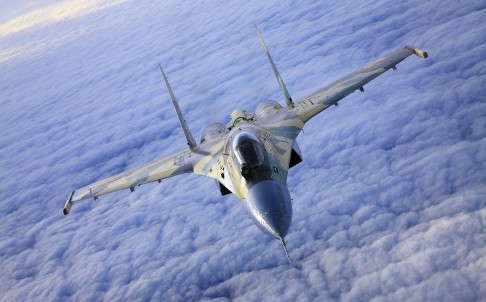
North Korea asked Russia to provide its armed forces with advanced fighter jets in a meeting between its special envoy and Russian President Vladimir Putin in November last year, a Seoul daily newspaper reported on Friday, citing a senior South Korean military official.
“Choe Ryong-hae, who visited Moscow as a special envoy of North Korean leader Kim Jong-un in November last year, asked Putin to provide Sukhoi Su-35 fighter jets,” the official told the JoongAng Ilbo.
On the prospects of North Korea actually purchasing the Russian fighter jets, the official sounded a negative note, saying, “But because of international sanctions imposed on the North, Russia won’t likely sell it readily.”
Choe, a high-ranking member of the North’s ruling Workers’ Party of Korea, met with Putin in Moscow on November 18 and handed him a personal message from the North Korean leader.
Two days later, after holding talks with Choe, Russian Foreign Minister Sergey Lavrov told reporters they confirmed the two countries’ “readiness to have contacts at all levels, including the highest one” at mutually convenient times.
“The North produces many weapons systems domestically, but it appears to have sought Russia’s help because building fighter jets requires more complex technologies,” the official was quoted as saying.
It is unknown how many jets the North attempted to acquire.
A spate of high-level exchanges in recent months between Pyongyang and Moscow has fuelled speculation that Russia will be Kim’s choice for his first overseas trip since taking office nearly three years ago.
Choe was accompanied by several other senior officials, including Kim Kye-gwan, North Korea’s first vice-foreign minister and its principal spokesman on nuclear issues.
South Korea may deport American author for her pro-North views
PUBLISHED : Saturday, 10 January, 2015, 3:29am
UPDATED : Saturday, 10 January, 2015, 3:29am
Associated Press in Seoul
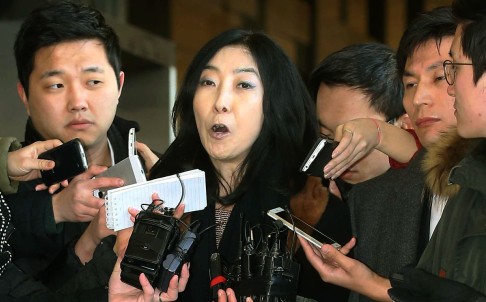
California-resident Shin Eun-mi (center) talks to the reporters at Seoul District Prosecutors' Office in Seoul, South Korea. Photo: AP
South Korean officials said yesterday they were considering whether to deport a Korean-American woman accused of praising rival North Korea during a recent lecture.
Prosecutors asked the Korea Immigration Service to deport visiting California-resident Shin Eun-mi after determining her comments violated South Korea's anti-Pyongyang security law, according to immigration officials.
The Korean Peninsula remains in a technical state of war, split along the world's most heavily fortified border since the 1950-53 Korean War which ended with an armistice, not a peace treaty. In South Korea, praising North Korea can be punished by up to seven years in prison under its anti-Pyongyang security law.
Critics have called for the security law to be scrapped, saying it infringes upon freedom of speech. Supporters argue that the law is needed because of constant threats from North Korea. Past authoritarian leaders in South Korea frequently used the law to suppress political rivals.
Shin regularly posted stories about her trips to North Korea on OhmyNews, a popular South Korean online news site. Her book on North Korea trips was included in a government-designated reading list in 2013, but the culture ministry withdrew it earlier this week amid criticism of the book. Ministry officials said they would seek to retrieve 1,200 copies that were distributed to libraries across South Korea.
During a November lecture in Seoul, Shin said many North Korean defectors living in South Korea had told her they want to go back home and North Koreans hope new leader Kim Jong-un would bring change.
She also praised the taste of North Korean beer and the cleanliness of North Korea's rivers.
Shin has said she had no intention of praising the country and was only expressing what she felt during her travels in North Korea.
In an article published by OhmyNews, Shin, 54, who arrived on a tourist visa from Los Angeles in November, said she would never return to South Korea permanently because her "mother country" no longer wants her. She was born in the South Korean city of Daegu and went to high school and university in Seoul.
Satellite images 'show North Korea's closer to developing missile-launching submarine'
PUBLISHED : Saturday, 10 January, 2015, 3:29am
UPDATED : Saturday, 10 January, 2015, 3:29am
Agence France-Presse in Seoul
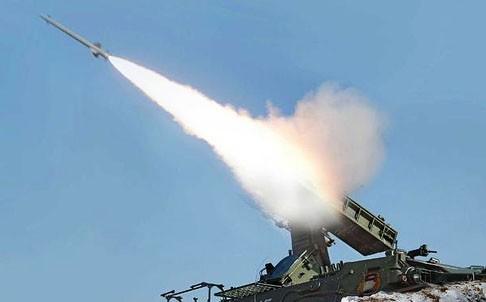
A self-propelled surface to air missile during a live military drill at an undisclosed location. Photo: North Korea's official Korean Central News Agency
Recent satellite images offer new evidence North Korea is developing a marine-based missile system that would give the nuclear-armed state a survivable second-strike nuclear capability, experts claim.
Commercial satellite pictures suggest the conning tower of a new North Korean submarine - first seen in July last year - houses one or two vertical launch tubes for either ballistic or cruise missiles, the US-Korea Institute at Johns Hopkins University said.
"The boat could serve as an experimental test bed for land-attack missile technology which, if successful, may be integrated into a new class of submarines," the institute said in an analysis posted on its closely-followed 38 North website.
Development of a submarine-launched missile capability would take the North Korean nuclear threat to a new level, allowing deployment far beyond the Korean peninsula.
However, the institute noted Pyongyang possessed no such capability yet and stressed its development would be an extremely "expensive and time-consuming endeavour" with no guarantee of success.
North Korea's small submarine fleet is comprised of largely obsolete Soviet-era and modified Chinese vessels, but suggestions it is experimenting with a marine-based missile system have been around for a while.
The South Korean Defence Ministry cited intelligence reports in September that Pyongyang was understood to be developing a vertical missile launch tube for submarine use. Ministry spokesman Kim Min-Seok said the North's 3,000-tonne Golf-class submarine could be modified to fire medium-range ballistic missiles.
And in October, a separate satellite image analysis by the US-Korea Institute identified a new missile test stand at the Sinpo South Shipyard in northeastern North Korea. The size and design of the stand suggested it was intended to explore the possibility of launching ballistic missiles from submarines or a surface naval vessel, the institute said.
Similar threads
- Replies
- 9
- Views
- 744
- Replies
- 3
- Views
- 375
- Replies
- 4
- Views
- 909
- Replies
- 2
- Views
- 481

